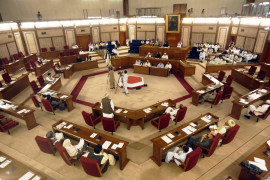A hearing on Balochistan
The mere fact that the US Congress saw fit to conduct these hearings shows how dire the situation really is.
There is reason to be both optimistic and cynical about hearings by the US Congress’s Foreign Affairs committee on the situation in Balochistan. The hope is derived from the fact that the state’s violations of human rights in the province, including alleged killings, abductions and torture, have generally been ignored by the international community and so, any publicity given to the issue can be seen as a net positive since it opens the prospect of a much-needed change in policy. At the same time, however, the sudden concern by some members of the US Congress about Balochistan could be part of larger strategic concerns that may have little to do with human rights and international law. The Americans have always been suspicious of Chinese investment in the region, including their involvement in the port of Gwadar and in the country’s energy sector. The proposed gas pipeline from Iran is also supposed to run through Balochistan. This, apart from the embarrassment caused to the federal government by the hearing having taken place, may explain the Foreign Office’s denunciation. Even the US State Department, acutely aware of how sensitive this issue is, distanced itself saying that the hearing did not reflect the policy of the US government and that the issue of Balochistan should be solved through internal negotiations.
Having said that, the mere fact that the US Congress saw fit to conduct these hearings shows just how dire the situation in the province really is. Human rights activists and experts apprised the committee of the violations taking place in Balochistan. A representative of Amnesty International even called for the Leahy Amendment to be applied to all military units operating in Balochistan. The said amendment is commonly applied to security assistance programmes to prevent foreign aid from being used to further human rights abuses. While one can understand why the Pakistan government is upset about the hearing, a better response may be to change in existing policy on Balochistan in a manner that the wishes of the local population are factored in. This is the best way of ensuring that the situation improves and that separatist feeling is quelled. That, clearly, is an end that should not even require prodding by a committee of American lawmakers.
Published in The Express Tribune, February 11th, 2012.



1732266251-0/Josh-Brolin-(1)1732266251-0-165x106.webp)
1732266343-0/BeFunky-collage-(82)1732266343-0-165x106.webp)













I watched the full hearing and this was an utterly biased group of US legislators who have particularly strong constituents in the diaspora and felt obliged to pander to them. Ali Dayan and Christine Fair did a decent job in presenting a fair portrayal of what is going on. The other panelists were so belligerent that it was hard to make any sense of them. The lowest point in the hearing was when the only Baloch member on the panel suggested that the US should grant Baloch independence so that US bases could be opened there as a foil to China! Is that really what our Balcoh brethren want? I dont think so! Many diaspora communities living overseas are quite detached from reality on such issues -- this is similar to the Tamil diaspora that lives in Canada who funded an insurgency that led to so much suffering and despair and was even more debilitating for the minority.
I am all for advocating human rights for Baloch, Shia, Ahmedi and all "minority" friends but demonizing Pakistan will not solve the problem. I would even favor a referendum in Balochistan after a serious engagement process but this kind of prejudicial security posturing at hearings is not going to do anyone any good. The Baloch have to note that there is a strong Pakhtun presence (with their own set of sub-tribes) in the province too -- trying to bring out tribalism will be detrimental for even a future Baloch independent state. Let us not forget that Pakistan's President is arguably of Baloch ancestry too! Surely the head of the state should do more for the rights of the province that is so persecuted. None of this nuance was even noted in the hearing. Ultimate goal should be common vision of humanitarian unity in Pakistan and indeed across South Asia. Starting point for that would be peace between Pakistan and India.
It has been the basis of US foreign policy and its State Department for decades..the policy of "divide and conquer", funding and arming opposing sides to cause civil war, chaos and bloodshed and thus weaken and break down a country to a primitive survival level for geopolitical control of the region and control of a country's resources. It's an established CIA and State Department strategy to create and back radical militant groups, at the same time pretending friendship against the "common enemy" by donating money and arms to a government's military to fight those same militants, with the goal of taking over after the country has been thoroughly divided and destroyed. As in Iraq, The US and NATO have taken over as an illegal occupying force in Afghanistan, wrecking the country with its occupation, genocidal bombing and shelling and planned internal conflict. The US/NATO have installed puppet government tyrants, hundreds of thousands of contractors and mercenaries in gated communities and an opium economy to impoverish and oppress the entire Afghan population. If Pakistan has any hope of surviving and prospering as an independent nation, it will restore its integrity and fire any of its officials taking US bribes, protect its airspace by shooting down all child killing drones (Pakistan is fully within its rights to do so, those drones are illegal and Pakistan has the air force to do it), block ALL NATO transports by sea or by air, kick out every last presence of US/NATO bases/contractor mercenaries/CIA from its country, and form military and trade pacts with friendly countries, such as Turkey, and Russia and eventually form an alliance with Afghanistan once the occupiers have been booted out from that region.
mr baloch are as much pakistanis as others are
every family has problems
Pakistan always doctored their history text books. So the generation next never learns the true history. And so they never learn from history.. and those who don't learn from history are doomed to repeat it ...
First Bangladesh .. now ...
Well done Noshad !
Let the Pakistani to cry we will be in our Free/Azad Balochistan very soo.
I appreciate this act of US government and thankful to the Senet Committee for discussing Balochistan issue. If it is not a issue then why Paki govt is worry about it? Since last sixty years Pakistani Military Forces and elite class ruling pakistan from Islamabad are involed in the killing of innocent Baloch people of Balochistan. They have the right to be independent form the accupasion of Pakistan. The people who are sitting in Islamabad, Lahore, Peshawar, Karachi and other cities are enjoying all the basic facilities never even know about Balochistan how the Balochi people live their life. If they dont know anything about Balochistan then why dont they let us be alone we dont need anything from Islamabad but we want them stop killing us stop t. aking our resources. They should withdraw the Army from Balochistan who is killing innocent Balochies. I want to ask the all the Pakistanies one question. Why do they support Kashmiries? why they are against India because the Indian Army involved killing Kashmiries then why dont they hate Pakistan Army Killing Baloch people and accupied Balochistan against the will of Baloch people. But now its too late for any dialouge ....mutilated bodies of innocent Baloch youth and our dear sisters will not late us make any dialouge with the murderers...... Balochistan will be discussed in all over the world parliament very soon in United Nation's chartered.......
If you don't do your job the way you are supposed to do it, someone else has to and will do it for you.Nature doesn't tolerate vacuum. You can't report your inability to attend office and at the same time tell them not to depute someone to do your job.If we respected the majority of Awami league (led by Mujib) and acted accordingly in 1971, India wouldn't have any excuse to interfere in east pakistan affairs.
They funded , trained and provided sanctuaries to Baloch insurgents for years in Afghanistan of course this was going to be the next step.
Confusing editorial. I don't follow the logic your using to imply that China investing in Balochistan is a concern to America let alone be the impetus for a hearing by the Republican's where the subject of China wasn't even mentioned. In my estimation this hearing had one purpose - to portray Pakistan in a negative light with the Republican objective of putting Obama and his administration in the awkward position of defending Pakistan.
Baluchs should stand up for their rights and dignity BUT they should be careful from the wolves in sheep's clothing. Americans don't care about Baluchs or Baluchistan; it is a colonial camouflage to grab its resources and encircle Iran. Americans are not, were never and will never be anyone's friend except their own interests.
A confusing editorial indeed :(
Every Pakistani admits that Baluchistan needs attention from our government and other stakeholders in our system, and we have done nothing good for the province over the past 20 years (After 1970).
However, how a leading national daily thinks that US congressional hearing poses optimism??? I am very critical of the spy agencies role in Pakistan's internal affairs (security and politics particularly) but we can't say that if international community starts debating our internal affairs, we should hope for something better. This may be a plot designing conference to devise a strategy to dismantle and disintegrate Pakistan further. I wish, we could find a difference in between our friends and foes.
The US is definitely looking to dismantle the state of Pakistan - when will Pakistanis wake up?
In global village events happening in one part of the world have impact on the other part of the world. Also in the current age of digital technology it is very hard to hide things from rest of the world. Pakistan has not learned its lesson from East Pakistan. Balochis, Afghanis and minorities have always been treated with contempt. Bad policies will lead to loss of more land mass. These hearing, in the future, will provide justification for boots on the ground.
Perhaps there are more thorny issues that need the house foreign affairs committees' immediate attention. Like the human right abuses in Gitmo, violence in Syria. This attitude, by no means, is going to be an ointment on the bruises of balochs.. Rather it reflects the persistent resolve of America to continue to meddle in other country's affairs..